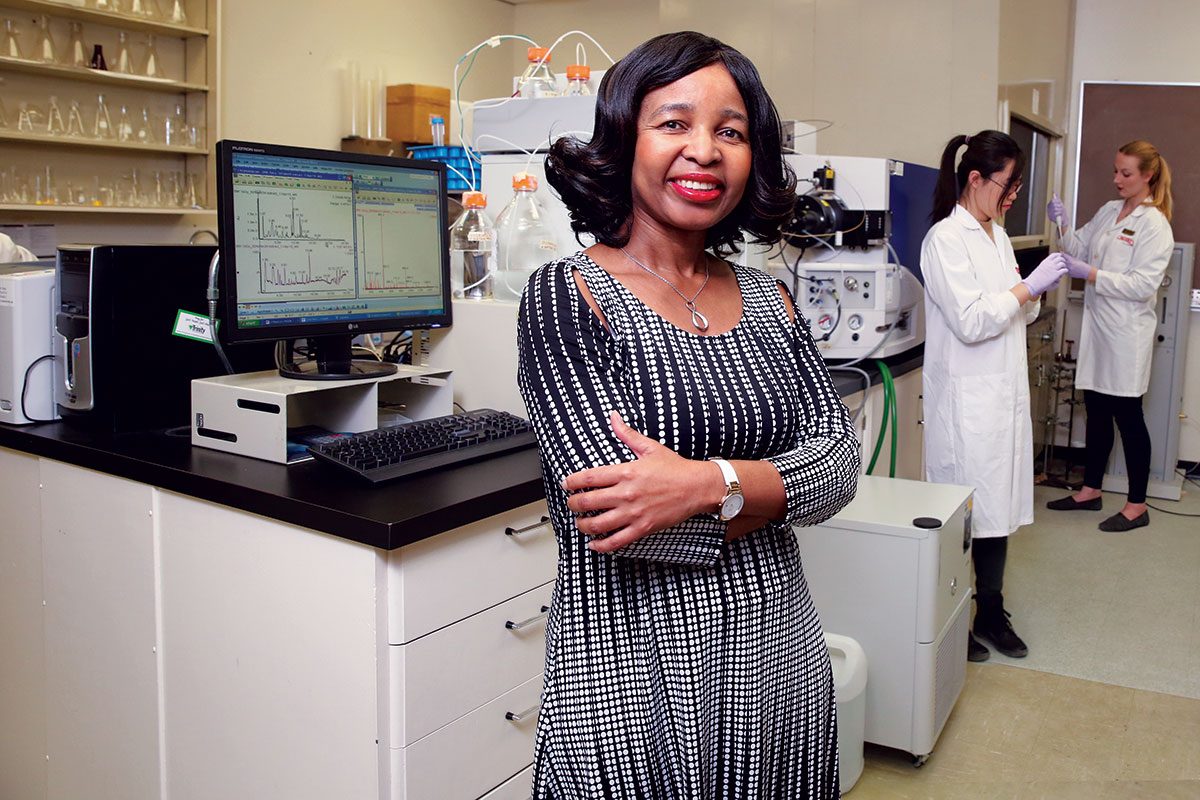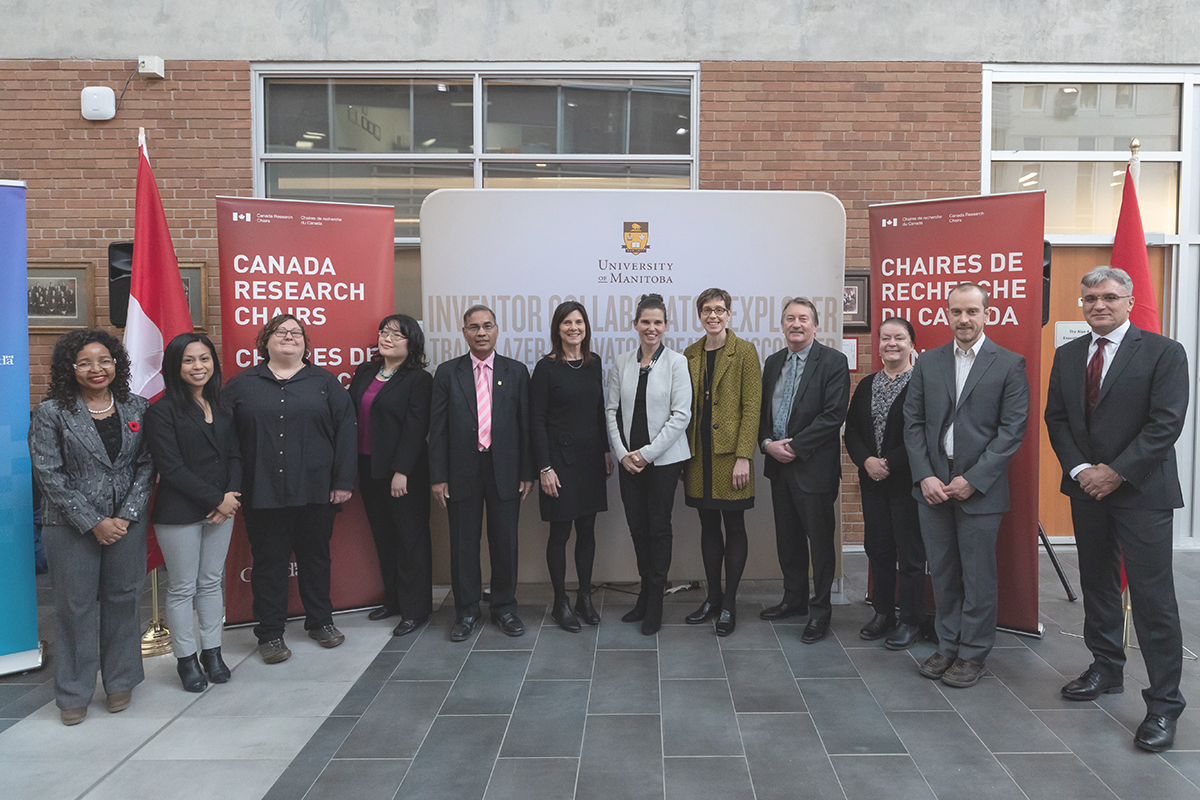
(L-R): PROFESSOR TRUST BETA IN HER LAB WITH STUDENTS YUWEI SONG AND PAMELA DRAWBRIDGE.
University of Manitoba receives 10 Canada Research Chairs
$9.5 million in new funding
The Honourable Kirsty Duncan, Minister of Science and Sport, was on the University of Manitoba campus on Nov. 14 to announce investments in the Canada Research Chairs Program, of which the University of Manitoba is a major recipient, with 10 Chairs named today.
Canada Research Chairs (CRC) improve our depth of knowledge and quality of life, and attract graduate students from around the world to Manitoba, helping drive our economy by fuelling discovery.
Seven of the 10 chairs named at the U of M will be held by women and two of the researchers joined Minister Duncan: Trust Beta, CRC in Grain-Based Functional Foods, and Nancy Kang, who comes to Manitoba from the United States to become a CRC in Transnational Feminisms and Gender-Based Violence.
“The future of research and science in Canada will be led by the next generation of talent,” Minister Duncan said. “That’s why it is so important that we support our early career researchers today. There’s is no better place than Canada to be a scientist. That’s why Canada Research Chairs come here from diverse backgrounds and choose Canada to pursue their ambitious research goals, build their teams and maintain Canada’s position as a global leader in research excellence.”
Digvir S. Jayas, Vice-President (Research and International) and Distinguished Professor at the University of Manitoba, echoed the Minister’s sentiments.
“I congratulate these 10 researchers on their success in earning these competitive funds,” he said. “They are trailblazers in their fields and will enrich our community with their ideas and discoveries.”
The 10 new and renewed chairs will receive an investment of $9.5 million from the CRC program.

The Nov. 14, 2018 Canada Research Chairs announcement.
The 10 CRCs

Janilyn Arsenio.
Janilyn Arsenio, internal medicine
Chair in Systems Biology of Chronic Inflammation
Heterogeneity in T cell fate and function is required for effective immune responses and the prevention of immune dysregulation. Dysregulation can lead to over-activated immune responses in autoimmune diseases and transplant rejections, or to a loss of immune function, termed exhaustion, in chronic infections and cancer. Arsenio’s research will define the molecular mechanisms underlying T cell differentiation into functional regulators of the immune system. This knowledge is essential for the development of novel therapies to effectively treat infectious and non-infectious (autoimmune and cancer) diseases and to enhance our understanding of immune responses during transplant rejections.

Trust Beta.
Trust Beta, food and human nutritional sciences
Chair in Grain-Based Functional Foods
The health care issues associated with North American diet and lifestyle include obesity, several forms of cancer and cardiovascular diseases. In order to counteract diet-related diseases, research in the area of functional foods is essential to allow development of accessible whole grain foods that will have a positive impact on the health of Canadians. Beta’s research addresses unique and critical questions relating to the extent to which constituents in foods can confer health benefits by scavenging excessive free radicals, inducing antioxidant defenses, reducing lipid oxidation, lowering LDL cholesterol, and inhibiting cancer cell proliferation following consumption of whole grain-based products.

Nediljko Budisa.
Nediljko Budisa, chemistry
Chair in Chemical Synthetic Biology
Coming from Technische Universitat Berlin, Germany
Modern genetic engineers aim at building living systems in order to establish technologies to produce virtually every imaginable medically or industrially interesting substance. The long-term objective of Budisa’s research is to create highly modular bio-inspired materials useful for both academia and (bio)industrial purposes. Budisa will achieve these objectives by 1) developing protein-based natural polymer materials with the potential to revolutionize bone surgery and wound healing; 2) engineering biological alternatives to conductive carbon nanotubes for use in energy storage, water filters, bio-electronic devices and more.

Annette Desmarais.
Annette Desmarais, sociology and criminology
Chair in Human Rights, Social Justice and Food Sovereignty (Renewed)
The goal of this research program is to advance research on the conceptual framework, practice, politics and potential of food sovereignty to build ecologically sustainable, socially-just, and healthy food systems. The objectives of the proposed research are: 1) to investigate the role of land tenure dynamics in enhancing and/or hindering the implementation of food sovereignty in Canada and beyond; 2) to conduct a gender analysis of member organizations of La Vía Campesina and its international strategies and structures; and 3) to analyze the experiences and challenges of youth entering agriculture and engaging in food system transformation.

Colin Gilmore.
Colin Gilmore, electrical and computer engineering
Chair in Applied Electromagnetic Inversion
Gilmore’s research program will advance the art and science of Applied Electromagnetic Inversion (EMI), which uses electromagnetic waves to quantitatively image internal properties of objects and inaccessible regions of interest. The objectives are to: 1) develop new EMI systems to improve imaging sensitivity and resolution; 2) advance the algorithms that create the images from the data; and 3) develop entirely novel systems (hardware and algorithms) for imaging remote targets. This research program will have immediate impact on food security, cancer diagnosis and monitoring, and arctic science and geo-prospecting.

Nancy Kang.
Nancy Kang, women’s and gender studies
Chair in Transnational Feminisms and Gender-Based Violence
Coming from the University of Baltimore, USA
Kang’s research will interrogate how black, Indigenous, and Asian-descended women in Canada and the United States articulate their experiences with gender-based violence in situations of mass oppression, or what may be termed inter-ethnic/inter-racial nodes. Nodes are clusters of historical experiences within which manifestations of violence—especially gender and sexuality-based—exist and flourish, often through state sanction. The research compares and contrasts transnational textualities (both lived and imagined) by using a postcolonial feminist-of-color lens. Such nodes as slavery, residential/boarding schools, incarceration, and immigration illustrate the need for multi-faceted dialogues between and about women of color.

Kiera Ladner.
Kiera Ladner, political studies
Chair in Miyo we’citowin, Indigenous Governance & Digital Sovereignties
Focusing on theoretical and community-based research, this program of research will deepen understanding of decolonization, reconciliation, and resurgence within Canada and Anglo-settler societies. Ladner’s research program will interrogate and pursues miyo-we’citowin, governance and community-based research through four major projects: 1) a comparative project on treaties which focuses on treaty narratives and their potential for decolonization; 2) a comparative constitutional law and Indigenous politics participatory digital archive project seeking to radically transform data collection and knowledge mobilization; 3) a collaborative Indigenous archives project addressing intellectual sovereignty and community-based research; and 4) a research and community outreach initiative on decolonizing governance and rebuilding communities.

Lorenzo Livi.
Lorenzo Livi, computer science
Chair in Complex Data
Coming from the University of Exeter, UK
Many natural and man-made systems are now observable with a high level of detail, allowing us to investigate and understand phenomena with an unprecedented level of sophistication. However, data describing such systems require complex representations encoding both temporal and spatial information. Livi’s research program will: 1) design data-driven methods to process spatio-temporal information represented as evolving graphs; 2) unravel the inner mechanisms explaining the functioning of (artificial) recurrent neural networks; 3) apply data-driven methods in structural biology and computational neuroscience for solving basic scientific problems having impact on society and health care.

Lisa Lix.
Lisa Lix, community health sciences
Chair in Methods for Electronic Health Data Quality
Electronic health databases, which contain digital information about an individual’s health and health care use, have significant potential to improve the population health. However, the accuracy and completeness of data in electronic medical records, registries, and administrative databases poses an ongoing challenge. Dr. Lix’s research will develop methods to measure and improve the quality of electronic health databases for studying chronic health conditions and predicting disease risk. Her research will lead to better health information systems for health care decision-making.

Sabine Mai.
Sabine Mai, physiology and pathophysiology, Research Institute of Oncology and Hematology, CancerCare Manitoba
Chair in Genomic Instability and Nuclear Architecture in Cancer
Global incidences of cancer are expected to increase by 68 per cent between 2012 and 2030, according to Cancer Research UK. The genomic complexity of cancer requires new insights to provide treatment decisions that are truly personalized for each patient. Dr. Mai’s novel and transformative research will focus on genomic instability and alterations in nuclear genome architecture followed by the translation of these findings into the clinic to achieve personalized medicine solutions.
Research at the University of Manitoba is partially supported by funding from the Government of Canada Research Support Fund.






